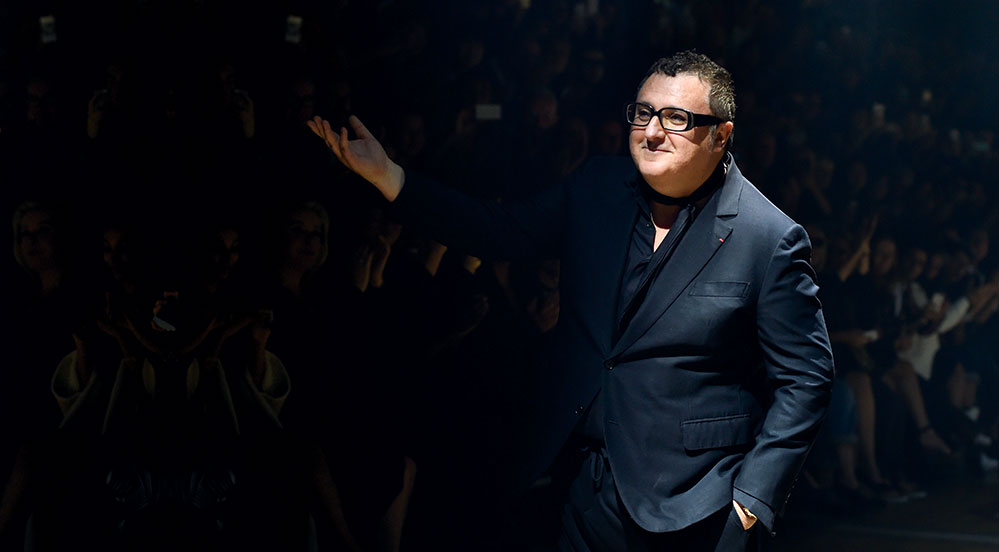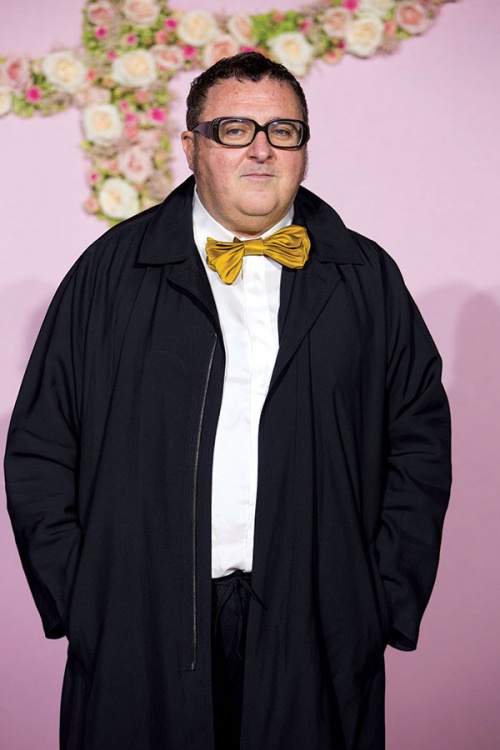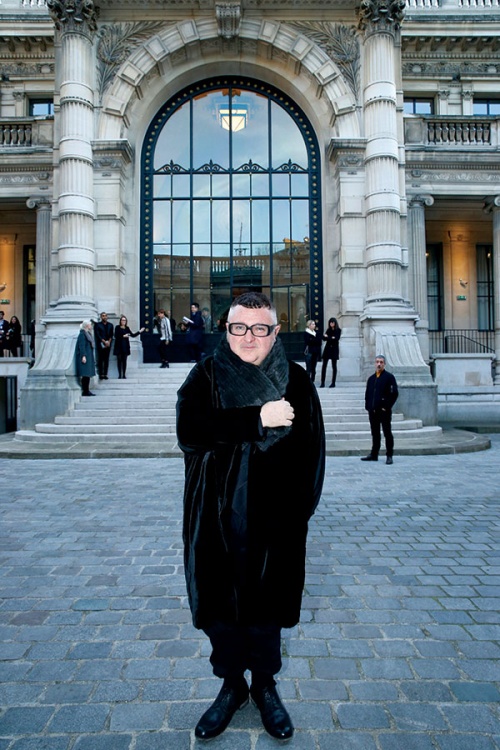Alber Elbaz: Life After Lanvin
Jun 01, 2016

Alber Elbaz is rediscovering the world after laying down the baton at Lanvin
On the surface, Alber Elbaz is the warm, jovial character he is popularly perceived to be. But dig a little deeper, below the natural bonhomie, and Elbaz shows signs that he is still recovering from the shock of his abrupt departure from Lanvin, the fashion house where he worked for more than a decade. Elbaz is loath to go into the circumstances of his leaving. He was one of the longest-serving big names in an industry where the revolving door never stops spinning. But catch him reflecting for a moment, and his breezy smile fades briefly.
“After what happened to me I was sad, really sad, and for a few months it was raining in Paris and I was crying and sometimes I did not know if it was the rain or my tears,” Elbaz says. “There is a moment when you go over it and start going from being emotional to being rational and think that maybe change is good in the world, it is important to move to different places,” he says.
“I like working with people and helping people and motivating people. My dream was to be a doctor. Maybe this is the time to go and study for eight years, and later I will be a doctor,” the designer says. He now jokes about studying medicine, but as a youngster, Elbaz, who was born in Morocco and brought up in Israel, wanted to become a general practitioner. It is easy to imagine him as a physician, listening solicitously to the woes of his patients before giving out cheery advice and dashing off a prescription.

Elbaz is taking a year off to see the world, visit friends and discuss his career options. Among the stops on his journey was Beijing, to keep up his long relationship with Tsinghua University’s department of fashion and design. He has strongly supported Uni-world, an online venture by the design and art colleges around the world, including Tsinghua University. Elbaz is one of the few big-name designers that take the time and effort to make more than an occasional cursory visit to China. He wishes in particular to encourage the next generation of Chinese designers. He has been visiting China for more than 15 years, forming close friendships with teachers, movers and shakers in the fashion industry in Beijing and Shanghai.
The advice Elbaz gives would-be designers is not always what they like to hear. He served in the cutting-room trenches before rising through the ranks to command first Yves Saint Laurent and later Lanvin. At the top, he says, the hours are longer and the pressure endless. “If you do well, you are a genius,” he says, “but if you don’t do well for one season, one year, you are, ‘Ugh, did you see that?’ The rapidity of the system is something we have to re-look at. We don’t need to create so many clothes. We finish one show and then we are on to the next.”
Elbaz’s assistants used to refer to him as the professor rather than the boss. “They left at the end of the day with a migraine from thinking because I pushed them to come up with solutions. It was always about why, and they always said that coming to work with me was like studying for a PhD,” he says. “The best teachers make you dream and push you forward. I was a student for many years. I saw my friends studying engineering and technology, and they would study three or four days a week and are home at four o’clock. We in fashion will study six days a week and at midnight we just had coffee because we have worked the whole night.”
Elbaz the professor sees himself more as a musician. “The thing that scares us the most is if you have a blank page and don’t have ideas but have to fill it up,” he says. “After so many years there are a lot of people that depend on the work, so you don’t just do it to show creativity, but to show responsibility to all the people who are supporting you. We designers are like conductors of a big orchestra. We depend on the orchestra.”
Elbaz the conductor put down his baton last year and left Lanvin without taking a bow. Taiwan investor Wang Shaw Lan owns Lanvin. For many women, however, Lanvin was Elbaz, its creative director, who made clothes that were elegant yet wearable, and who understood intimately the needs and wants of women. Affectation and out-there experimentation had no place in Lanvin collections. Serenity, sophistication and continuity were the hallmarks. If the boss wanted to have a bit of after- hours fun, he enlisted another brand as playmate; H&M was his most notable. Elbaz’s range for the Swedish retail giant included a T-shirt bearing one of his own sketches.
His artistic doodles are more than a commercial gimmick. Invite Elbaz to a quiet, convivial gathering, give him a couple of drinks, and he will happily create a caricature for anyone who asks. He clearly enjoys making people laugh, joking self-deprecatingly about his short stature, chubbiness and double chin. He would have a good chance of making it as a stand-up comedian.
But Elbaz will stay in the fashion industry. Paradoxically, the parting of the ways with Lanvin renewed his faith in the integrity of the industry as a whole. His devotees were upset and saddened, legions taking to the social media to express their support and sympathy for the ousted boss. “We live for fashion, and a lot of people from outside think it is a horrible industry with a lot of nasty people,” he says. “Everyone has to be skinny and bitchy and start at midday with a glass of champagne because we don’t wake up early.”
Elbaz disputes these notions. “It is such a myth. It is a wonderful, wonderful industry where people are friendly, nice and loyal. During the last few months, with what I was going through, I saw so much loyalty and solidarity which made me think it is a fabulous industry. We have a reputation for endless shows and parties but we live through a lot of tension and pressure and hours and insecurity,” he says. “It is beautiful to take a year off and have a different perspective, I have wanted to do it for a long time, but when you are in the system you don’t have time. The true luxury is time. I have been doing a lot of thinking and dreaming of what is next, what will make me happy.”
Elbaz’s future role is still unclear. But once his sabbatical year is up, women the world over can probably look forward to seeing new designs from one of the maestros of fashion today. Whoever offers him a contract can be sure of getting a diligent, industrious and entertaining employee whose designs are certain to be wearable, rather than eccentric or self- indulgent.

“I love women. That is why I put so much good vibes into design,” Elbaz says. “I was asked if there was a difference between Chinese, French or American women. I said no, because every woman I know likes to wear a red dress, eat chocolate and will cry when her daughter gets married. Many people think women dress for men, to be seductive and sexy. Trust me, men are not looking at fashion. I think women are dressing for other women. All over the world I see the same thing. I think they dress to upset their girlfriends. I think the best-dressed women are the ones who dress for themselves. They look in the mirror and they say, what is it that I want to do and how do I want to look? So we all want to look beautiful in photos in the age of Instagram.”
Even Elbaz made an effort to pretty himself for the camera – an endeavour that was less than wholly successful. Told by his Hollywood pals that his portly build and conspicuous double chin might make the beautiful people shun him, he signed up for cosmetic adjustments.
The adjustments failed to change his appearance much, but formed the basis of another self-deprecating anecdote. “The doctor did something to my chin, but not enough.
It involved electricity and was painful and cost me a lot of money,” the designer says. “And, you know what? When I went to Los Angeles I spoke to so many people and felt so comfortable and loved – and realised the world doesn’t care that much about double chins.”

























